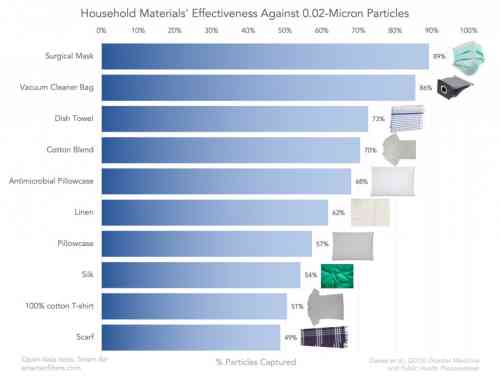DIY Masks
[This essay is adapted and expanded from a comment I made in another essay.]
One of my businesses is an online vacuum cleaner supplies store. I just tested HEPA vacuum cleaner bag material for breathability when used as material in a do-it-yourself face mask. It turns out that HEPA is extremely difficult to breathe through when attached to the face with a good seal. It will not make a good DIY mask.
The typical vacuum cleaner motor produces about 3 pounds per square inch (psi) of suction. Maximum human suction via lung power is 1.38 psi for men and 0.94 psi for women. That's maximum. Normal breathing psi is considerably less.
The current gold standard of non-powered respirators, colloquially known as N95 masks, filter out 95% of very small (0.3 micron) particles and trap almost all bacteria and most viruses in their filter matrix. N95 respirators must be fitted to the individual, won't work for some people, a seal against the face must be established and maintained to achieve high efficiency, and they're virtually impossible for non-medical personnel to obtain.
In comparison, HEPA vacuum bags filter 99.7% of 0.3 micron particles and WOULD make efficient face masks IF they could be breathed through when sealed against the face. But that's not practical when air movement is powered by human lungs.
Here's an excerpt of an article I wrote for my website that explains a bit about HEPA:
What is HEPA Filtration?
High-Efficiency Particulate Air (HEPA) filtratiion is an extended-surface dry-type filtration system with a minimum particle removal efficiency of 99.97% for particles down to 0.3 micron diameter (300 nanometers) as well as providing high efficiency filtration of both larger and smaller particles. A HEPA rating is established using a smoke challenge test consisting of particles of 0.3 micron average diameter.
An alternative to HEPA vacuum bags are what are known as micron or allergen filtration bags. Micron Filtration retains 100% of dust mites, grass pollen and ragweed plus particles 15 times smaller than the diameter of a human hair (5 microns). Vacuum bags with Micron Filtration will trap a large portion of lung irritants as well as most bacteria and viruses. They're somewhat easier to breath through but more susceptible to damage from moisture.
Testing of Various Mask Materials
Cambridge University researchers tested a wide range of common household materials for homemade masks. The coronavirus is just 0.1 microns. Could homemade masks capture virus particles that small? The scientists tested 0.02 micron Bacteriophage MS2 particles (5 times smaller than the coronavirus) against various materials.
The Scientific Conclusion: Based on particle capture and breathability, the researchers concluded that cotton t-shirts and pillow cases are the best choices for DIY masks. Paper towels were tested separately and found to be far less effective than the other materials tested.
Although the tea towel and the vacuum bag captured the most particles, they were also the hardest to breath through. With two layers, the tea towel was over twice as hard to breathe through as the surgical mask. In contrast, the pillow case, t-shirt, scarf, and linen were all easier to breathe through than the surgical mask.
Ibid.



Comments
It's insane.
The N95 mask is a miserable item to use for most.
It's fine for someone who is not moving a lot and is in a stable temperature. A well trained doctor or nurse understands this. If you start to exert yourself, it becomes almost useless due to flow restriction which reduces effectiveness.
I've seen some well trained individuals in the ER have difficulty during a stressfull situation.
There is a thing called overkill and any mask, good or bad, is better than nothing.
Regardless of the path in life I chose, I realize it's always forward, never straight.
I take that back.
This may not be a good idea.
Regardless of the path in life I chose, I realize it's always forward, never straight.
Are you implying that the best we can now do
is bend over and kiss our ass goodbye?
Ben Dover
In Army Boot Camp, they told us that in the event of a nearby nuclear explosion, we should just bend over, put our head between our knees, and kiss our asses goodby.
Electrostatic properties of masks
enhance trapping of particulate matter such as viruses and other pathogens. Washing and other forms of sterilization can damage or destroy this essential property.
On DIY masks
According to Dr. David Price, only medical professionals working in hospitals need N95 quality masks. For us civilians walking around elsewhere, a simple surgical mask is fine and even a bandana is better than nothing. The reason is because the coronavirus is mainly spread by droplet emission. This means that to get infected, you have to be very close to someone while they sneeze or cough on you, or they have to expel droplets onto a surface, which you then touch, and then you touch your face. That is the usual mode of transmission. If you have any sort of mask, it will help you prevent touching your face, thereby interrupting the typical transmission path. Combine this with good hand hygiene (washing hands, using hand sanitizer) and the risk of being infected is greatly reduced.
Dr. Price knows whereof he speaks: he has spent the past several weeks caring for Covid19 patients in NYC's Weill Cornell hospital. Below is a link to a video in which he talks about how you catch Covid19, how you can protect yourself from catching it, and what to do if you do catch it.
https://vimeo.com/399733860